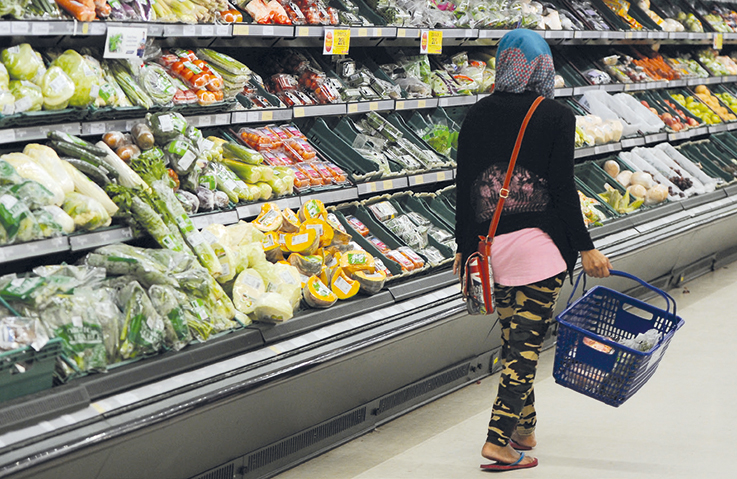Malaysia’s inflation down 2.9%, lowest in 10 years
Malaysia’s Consumer Price Index (CPI) fell 2.9% to 117.6 points in April from 121.1 in the same month last year — the lowest level since 2010 — as low average crude oil prices dragged transport costs lower by 21.5%. “The decrease in the overall index was driven by the decline in transport (-21.5%), and housing, water, electricity, gas and other fuels (-2.2%) that contributed 14.6% and 23.8% of overall weight respectively,” DoSM chief statistician Datuk Seri Dr Mohd Uzir Mahidin said in a statement. However, food and non-alcoholic beverage — which contribute 29.5% of CPI weight — continued to rise in April. Earlier this month, Bank Negara Malaysia said the country’s average headline inflation is expected to be in negative territory this year due to the anticipation of lower global crude oil prices. The outlook for headline inflation could remain heavily impacted by global oil and other commodity prices, including food and changing demands. (The Malaysian Reserve)
All arrivals in Malaysia to pay cost of own mandatory quarantine from June 1
From June 1, all those entering Malaysia will have to pay RM150 for each day they are in mandatory quarantine, says Senior Minister Datuk Seri Ismail Sabri Yaakob. Malaysian citizens, however, will only pay 50% of the charge. “Non-citizens including spouses and dependents who are of permanent resident status will have to pay the charges in full, ” he said. Ismail Sabri said the National Security Council also decided that those who want to return to Malaysia will have to sign a letter of undertaking agreeing to bear the quarantine costs. “The Immigration Department will also be issuing a directive to all airline companies to make it a condition for passengers disembarking in Malaysia to have the letter, ” he said. To date, 38,371 Malaysians who returned from overseas were quarantined and 30,200 individuals had completed the process and were allowed to go home. (The Star Online)
US$250 billion cross-border real estate deals done in 2019, says Juwai.com
Cross-border buyers, with the majority from Asia, purchased 500,000 homes in the G7 countries last year, worth an aggregate value of US$250 billion, says property portal Juwai.com. While the largest number of cross-border property buyers originate in mainland China, significant numbers also come from the Chinese territories of Hong Kong and Taiwan, and Singapore, India, Japan, Korea, and Malaysia. It said Asia is the scene of wealth creation at a pace not seen anywhere else. Juwai IQI executive chairman Georg Chmiel said while the coronavirus pandemic has dealt a painful blow to economies all over the world, the virus has also given added motivation to cross-border buyers from Asia. Juwai.com said non-China Asian buyers account for 20% of the real estate buying enquiries that it receives. In Malaysia, eight of the top 10 foreign real estate investor groups hail from other parts of Asia. IQI Global group chief executive officer Kashif Ansari said real estate is the new global currency, and more investors seek to diversify their investments. (NST Online)
Perlis state govt unit’s commercial property management inefficient
The commercial property management of the Perlis State Economic Development Corporation (PKENPs) was not managed efficiently in 2018. According to the 2018 Auditor-General’s Report Series 2, the report also found that PKENPs did not fully achieve its set goal and objectives. “The targets for the real estate development were set without taking into account its financial resources, potential investors and real market demand,” it said. As of July 31, 2019, it was estimated that a total of RM10.91 million in losses were incurred due to uneconomical development projects namely the Halal Park Project (RM7.79 million) and the Easy Shop Project (RM3.12 million), said the report. The report stated that PKENPs also suffered an estimated loss of RM3.4 million following the Pauh Industrial land price reduction. “To enable corrective action to be taken by the department head, the National Audit Department has also outlined four recommendations for the management of the commercial property activity to rectify its weaknesses,” the report said. (Malay Mail)
Covid-19: Malaysia and Singapore to sail through together
Malaysia and Singapore will continue to share knowledge and experience in the battle against the Covid-19 pandemic, and will remain committed to strengthening their longstanding and multi-faceted bilateral relationship. “Tough times shall be endured together, stronger,” said Finance Minister Datuk Seri Tengku Zafrul Abdul Aziz in a Facebook post following a video conference with his Singaporean counterpart Heng Swee Keat. Meanwhile, Heng, who is also the republic’s Deputy Prime Minister, shared in a post on his Facebook page that their discussion was centered on the Covid-19 situation in both countries, and around the world. “We also discussed on how we can steer our economies towards recovery as we gradually re-open, and explored areas to strengthen bilateral cooperation,” said Heng. Both ministers also reaffirmed the longstanding and multi-faceted bilateral relationship and the need to work with each other. (The Sun Daily)





